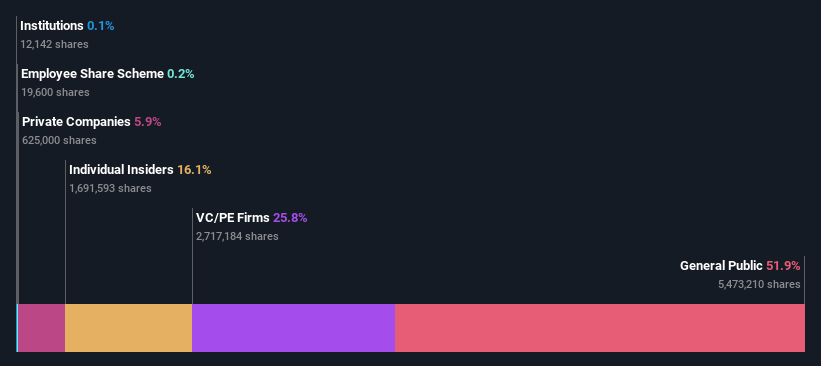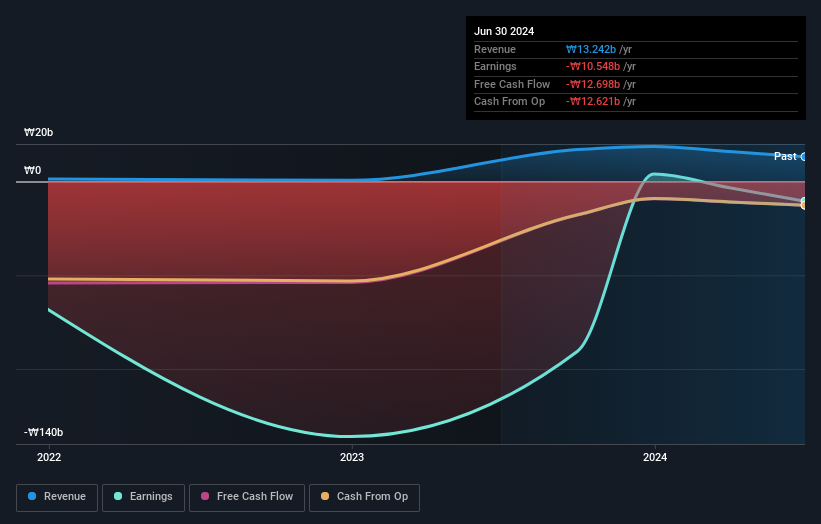- South Korea
- /
- Biotech
- /
- KOSDAQ:A347850
D&D Pharmatech Inc.'s (KOSDAQ:347850) stock price dropped 16% last week; retail investors would not be happy

Key Insights
- Significant control over D&D Pharmatech by retail investors implies that the general public has more power to influence management and governance-related decisions
- 48% of the business is held by the top 14 shareholders
- Insiders own 16% of D&D Pharmatech
If you want to know who really controls D&D Pharmatech Inc. (KOSDAQ:347850), then you'll have to look at the makeup of its share registry. With 52% stake, retail investors possess the maximum shares in the company. Put another way, the group faces the maximum upside potential (or downside risk).
And last week, retail investors endured the biggest losses as the stock fell by 16%.
In the chart below, we zoom in on the different ownership groups of D&D Pharmatech.
View our latest analysis for D&D Pharmatech

What Does The Lack Of Institutional Ownership Tell Us About D&D Pharmatech?
Small companies that are not very actively traded often lack institutional investors, but it's less common to see large companies without them.
There are many reasons why a company might not have any institutions on the share registry. It may be hard for institutions to buy large amounts of shares, if liquidity (the amount of shares traded each day) is low. If the company has not needed to raise capital, institutions might lack the opportunity to build a position. It is also possible that fund managers don't own the stock because they aren't convinced it will perform well. D&D Pharmatech might not have the sort of past performance institutions are looking for, or perhaps they simply have not studied the business closely.

D&D Pharmatech is not owned by hedge funds. With a 14% stake, CEO Seul-ki Lee is the largest shareholder. Octave Life Sciences is the second largest shareholder owning 10% of common stock, and InterVest Co., Ltd. holds about 8.1% of the company stock.
A deeper look at our ownership data shows that the top 14 shareholders collectively hold less than half of the register, suggesting a large group of small holders where no single shareholder has a majority.
While it makes sense to study institutional ownership data for a company, it also makes sense to study analyst sentiments to know which way the wind is blowing. We're not picking up on any analyst coverage of the stock at the moment, so the company is unlikely to be widely held.
Insider Ownership Of D&D Pharmatech
The definition of company insiders can be subjective and does vary between jurisdictions. Our data reflects individual insiders, capturing board members at the very least. Management ultimately answers to the board. However, it is not uncommon for managers to be executive board members, especially if they are a founder or the CEO.
Most consider insider ownership a positive because it can indicate the board is well aligned with other shareholders. However, on some occasions too much power is concentrated within this group.
Our most recent data indicates that insiders own a reasonable proportion of D&D Pharmatech Inc.. Insiders own ₩73b worth of shares in the ₩456b company. It is great to see insiders so invested in the business. It might be worth checking if those insiders have been buying recently.
General Public Ownership
The general public, who are usually individual investors, hold a substantial 52% stake in D&D Pharmatech, suggesting it is a fairly popular stock. This size of ownership gives investors from the general public some collective power. They can and probably do influence decisions on executive compensation, dividend policies and proposed business acquisitions.
Private Equity Ownership
With an ownership of 26%, private equity firms are in a position to play a role in shaping corporate strategy with a focus on value creation. Some might like this, because private equity are sometimes activists who hold management accountable. But other times, private equity is selling out, having taking the company public.
Private Company Ownership
We can see that Private Companies own 5.9%, of the shares on issue. It's hard to draw any conclusions from this fact alone, so its worth looking into who owns those private companies. Sometimes insiders or other related parties have an interest in shares in a public company through a separate private company.
Next Steps:
I find it very interesting to look at who exactly owns a company. But to truly gain insight, we need to consider other information, too. For instance, we've identified 1 warning sign for D&D Pharmatech that you should be aware of.
Of course this may not be the best stock to buy. Therefore, you may wish to see our free collection of interesting prospects boasting favorable financials.
NB: Figures in this article are calculated using data from the last twelve months, which refer to the 12-month period ending on the last date of the month the financial statement is dated. This may not be consistent with full year annual report figures.
New: Manage All Your Stock Portfolios in One Place
We've created the ultimate portfolio companion for stock investors, and it's free.
• Connect an unlimited number of Portfolios and see your total in one currency
• Be alerted to new Warning Signs or Risks via email or mobile
• Track the Fair Value of your stocks
Have feedback on this article? Concerned about the content? Get in touch with us directly. Alternatively, email editorial-team (at) simplywallst.com.
This article by Simply Wall St is general in nature. We provide commentary based on historical data and analyst forecasts only using an unbiased methodology and our articles are not intended to be financial advice. It does not constitute a recommendation to buy or sell any stock, and does not take account of your objectives, or your financial situation. We aim to bring you long-term focused analysis driven by fundamental data. Note that our analysis may not factor in the latest price-sensitive company announcements or qualitative material. Simply Wall St has no position in any stocks mentioned.
About KOSDAQ:A347850
D&D Pharmatech
A clinical-stage biotech company, develops medicines in South Korea and the United States.
Excellent balance sheet minimal.


